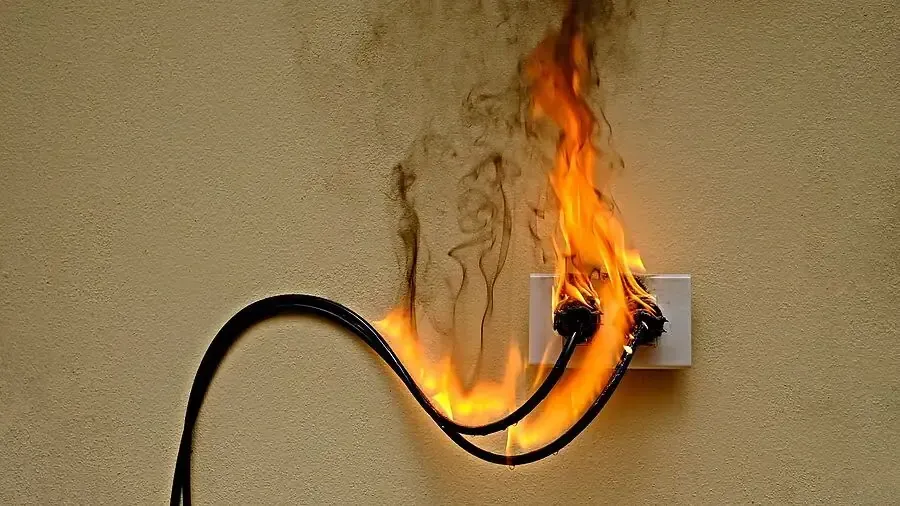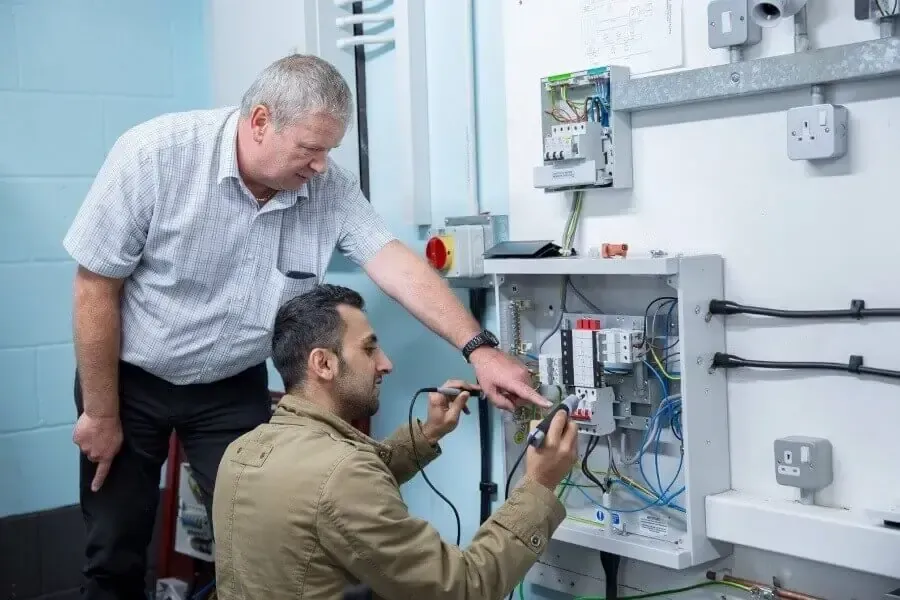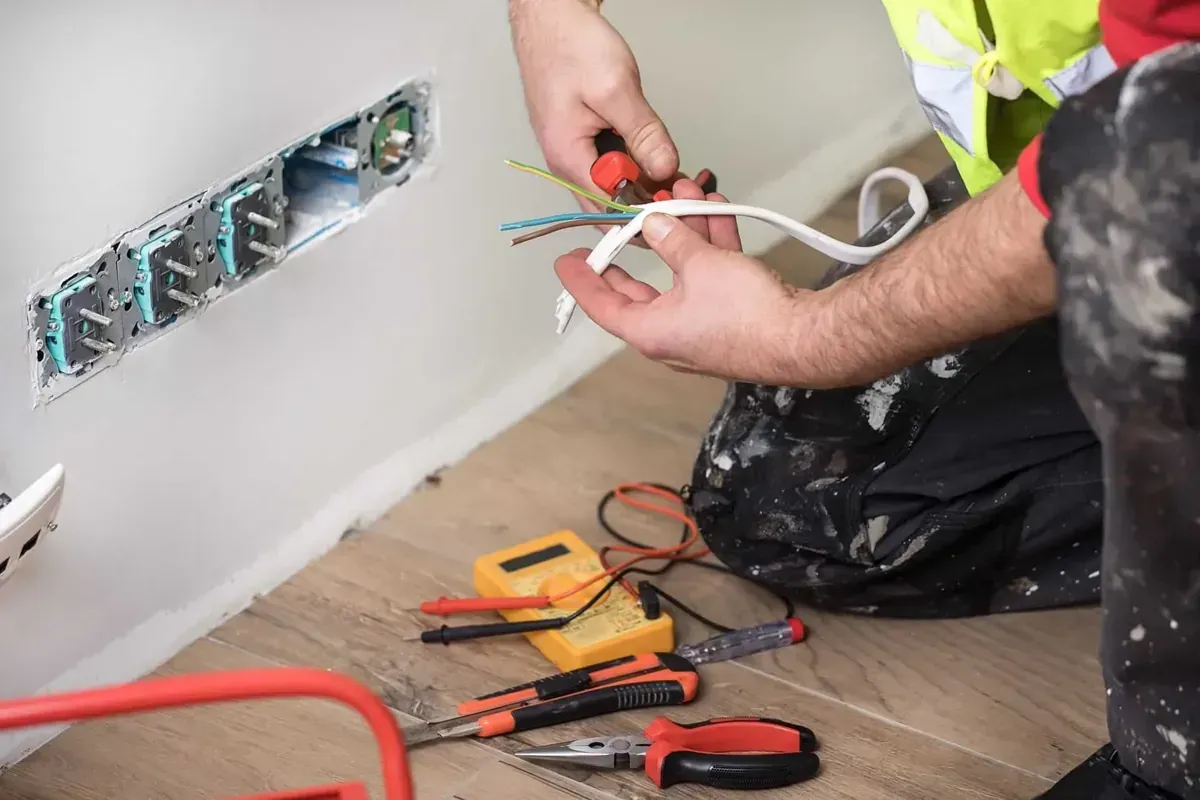How to Prevent Electrical Fires in Throop, PA: Common Hazards & Safety Checks
House fires from faulty wiring devastate families every year. Most are completely preventable. Recognizing danger signs and taking protective measures keeps your loved ones safe and your property secure.
Understanding How House Fires Begin
Residential fires ignite when power systems malfunction. Heat accumulates where it shouldn't, inside walls, behind outlets, within appliance cords. When that heat reaches combustible materials like wood framing, insulation, or fabric, flames erupt.
Three scenarios cause most problems: aging wiring struggling with modern power demands, overloaded circuits handling too many devices, and deteriorated cords exposing bare copper wire.
Dangerous Situations to Recognize

Overloaded Power Circuits
Stacking multiple adapters and power strips into one receptacle overburdens the circuit. The receptacle cannot disperse the heat from excessive current flow, leading to dangerous temperatures.
Protective action: Limit each receptacle to one major appliance. Refrigerators, microwaves, and heaters need dedicated circuits. Require more power access? Hire a qualified technician to install additional circuits instead of chaining extension cords.
Damaged Power Cords
Cords showing cracked insulation or exposed wiring create immediate danger. The protective coating prevents sparks from reaching flammable objects. When that barrier fails, risk multiplies instantly.
What to check: Run your fingers along unplugged cords, feeling for soft spots, cracks, or unusual warmth. Visible copper wire means immediate replacement, not repair. Never tape damaged cords. Discard them.
Aging Home Wiring
Older houses weren't built for today's power consumption. Original circuits cannot safely support laptops, televisions, gaming systems, and smart home devices operating simultaneously. This is particularly common in Throop, PA, where many homes date back decades.
Warning indicators: Dimming lights when starting appliances, unusual warmth around switches, or persistent burning odors near fixtures all signal wiring troubles requiring expert evaluation.
Portable Heater Dangers
Space heaters draw enormous current while generating intense heat. Positioning them near furniture, curtains, or bedding creates immediate fire risk.
Safe operation: Maintain three-foot clearance around heaters. Never operate them unattended or overnight. Plug directly into wall receptacles. Extension cords cannot handle the amperage safely.
Home Safety Inspections
Early detection prevents emergencies. Schedule monthly walk-throughs using these guidelines.
Monthly Safety Checks
Examine these critical areas once monthly:
- Receptacle discoloration: Dark stains indicate dangerous heat exposure occurred.
- Unusual sounds: Receptacles and switches should operate silently. Crackling, buzzing, or popping requires immediate expert attention.
- Strange odors: Sharp plastic or burning rubber smells near fixtures demand investigation.
- Temperature testing: Touch switch plates and receptacle covers. They should feel room temperature, never warm or hot.
Main Panel Inspection
Your home's main panel distributes power throughout the structure and needs regular attention.
Inspection guidelines: Verify every breaker has clear labeling. Breakers tripping repeatedly warn of serious problems. Never ignore them or replace them with higher-amp versions without expert guidance.
GFCI Testing Procedures
Ground Fault Circuit Interrupter receptacles protect against electrocution in wet areas. These have test and reset buttons built into their faces.
Monthly testing: Push the test button. The receptacle should click and stop providing power. Press reset to restore function. Non-functioning tests mean the receptacle failed and needs replacement.
Light Fixture Guidelines
Exceeding recommended bulb wattage creates excessive heat that damages sockets and wiring.
Best practice: Check fixture labels for maximum wattage ratings. Switch to LED bulbs. They produce equivalent illumination while generating far less heat and consuming less energy.
Developing Smart Power Habits
Disconnect Idle Devices
Electronics left plugged in continue drawing current and generating heat even when powered off. Phone chargers, coffee makers, and small appliances should disconnect between uses.
Extension Cord Guidelines
Extension cords provide temporary power access, not permanent solutions. Running them under carpets, through walls, or across doorways creates hazards.
Important principle: Regular extension cord use in any location means you need a technician to install a receptacle there.
Water and Electricity Separation
Water conducts current, creating electrocution hazards. Keep all devices, cords, and receptacles away from sinks, tubs, and moisture-prone areas.
When Expert Help Becomes Necessary
Some problems exceed homeowner capabilities. Licensed technicians possess specialized training, tools, and experience for working safely with high-voltage systems.
Contact a professional for:
- Breakers tripping constantly
- Lights flickering throughout multiple rooms
- Sparking when plugging in devices
- Unidentifiable burning smells
- Visible smoke near components
- Receptacles or switches too hot to touch
Critical Safety Equipment
Smoke Detector Installation
Smoke detectors provide first warning of danger. Install them in bedrooms, outside sleeping areas, and on every floor including basements.
Maintenance routine: Test monthly using the test button. Replace batteries during daylight saving time changes. Replace entire units every ten years.
Arc Fault Protection
Arc Fault Circuit Interrupters detect dangerous arcing and sparking that ignites fires. Building codes now require AFCI protection in bedrooms and living spaces.
Quarterly Safety Checklist
Review these items every three months:
- Inspect all visible cords for damage
- Verify no receptacles handle excessive devices
- Test smoke detectors and replace batteries
- Ensure major appliances have dedicated circuits
- Check no extension cords run under rugs
- Test all GFCI receptacles in wet locations
- Confirm clear access to main panel
- Verify correct bulb wattages in all fixtures
Family Education
Everyone in your household should understand basic safety principles. Teach children never to insert objects into receptacles. Show everyone how to identify sparking and unusual burning smells.
Exterior Safety Considerations
Weather-Resistant Covers
Exterior receptacles require weatherproof covers preventing rain, snow, and insects from entering. Water infiltration causes shorts and corrosion.
Every exterior receptacle must have GFCI protection. Moisture and current create lethal combinations. GFCIs prevent tragic accidents.
Weather Exposure Reviews
Outdoor fixtures, covers, and any exterior cords deteriorate faster than indoor components. Inspect them seasonally for damage.
Understanding Circuit Capacity
Each circuit has limits. Exceeding those limits trips breakers or, worse, overheats wiring inside walls where you cannot see it.
Circuit Amperage Limits
Standard bedroom and living room circuits typically handle 15 amps. Kitchen and laundry circuits usually accommodate 20 amps. Large appliances like dryers, ranges, and central air conditioners require dedicated high-amperage circuits.
Load Calculation Methods
Add the wattage of everything on one circuit. Divide that total by your home's voltage, typically 120 volts, to determine amperage. Keep usage well below the circuit's maximum rating.
Seasonal Safety Awareness
Winter Protection
Space heaters cause numerous winter fires in Throop, PA. Never use them with extension cords. Keep them away from anything combustible. Turn them off when leaving rooms.
Summer Cooling
Air conditioners draw substantial current. Window units need their own receptacles. Operating them on circuits with other devices risks overloading.
Holiday Decoration Precautions
String lights increase demand significantly. Inspect every strand before installation. Limit connected strands according to manufacturer instructions.
Maintaining Long-Term Safety
Prevention requires ongoing attention, not one-time fixes. Perform regular reviews. Use appliances correctly. Recognize when situations require expert help. These habits dramatically reduce risk.
Vigilance protects your most valuable assets: your family and home. Address warning signs promptly.
Need professional safety services in Throop, PA? Contact Bee-lectric today. Our licensed technicians identify hidden hazards and ensure your home's power systems meet safety standards.



